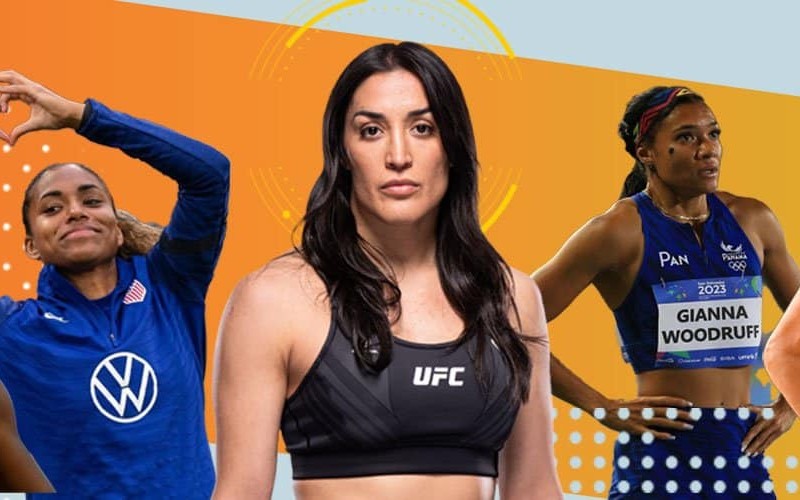5 Game-Changing Latina Athletes Who Should Be Household Names
Brace yourselves for a lineup of powerhouse Latina athletes who redefine what it means to dominate their game.

In the sea of men that is athletics, women are fighting tooth and nail for their long-overdue recognition. Among them, Latina athletes are ferocious in their pursuit of excellence, and they’re already changing the game, trailblazing for the next generation.
These 5 Latina athletes have overcome enormous challenges, broken significant barriers, and are actively leaving their mark on athletics.
Tatiana Suarez
Tatiana Suarez is of Mexican descent and an impressive mixed martial artist who has overcome the odds both inside and outside the ring. It’s safe to say Tatiana was born with a passion for wrestling since she started doing it right before her fourth birthday. She started her career in 2013, and her wrestling background was already so impressive, it was a struggle to find an opponent for her first amateur fight.
After overcoming more hurdles than most people face in their lifetime, Tatiana made her MMA debut in 2014 with a TKO in her first round. Her star has been rising ever since. She’s had many notable wins, including the strawweight tournament of The Ultimate Fighter 23. As is the case with a contact sport as demanding as wrestling and MMA, Tatiana sustained severe injuries. During the course of treatment, doctors discovered cancer which put Tatiana in a different kind of fight – a fight for her very life.
Tatiana’s herculean battles inside and outside of the ring are told in a recent HBO documentary, aptly named The Unbreakable Tatiana Suarez. The documentary itself also broke barriers when it was released, becoming the first feature documentary about a Latina athlete to be made by HBO.
Catarina Macario
If you haven’t been inspired to root for Team USA in soccer quite yet, that time has probably arrived. Catarina Macario, born in São Luís, Maranhão, Brazil, is the first player born outside of the United States to qualify for the U.S. Women’s National Soccer Team, and her performance is showing everyone why she earned that history-making spot.
Catarina is a versatile player who shines as an attacking midfielder and a center forward, which provides a distinct advantage in the sport. When she’s not playing for Team USA and contributing to their powerhouse success, she’s playing for Chelsea in the English Women’s Super League.
Gianna Woodruff
Gianna Woodruff is a Panamanian track and field athlete, and she’s considered one of the best Latina athletes in the discipline. Though she was born in Los Angeles, she decided to compete for Panama to honor her mother’s native country and champion her Latinidad.
In the Pan American Games Santiago 2023, Gianna won the gold medal in the women’s 400m hurdles and wrote her name in the record books. This is the first time Panama holds the women’s 400m hurdles record. She made history but noted that she’s ready for other Latina athletes to share the stage with her. In an article from the World Athletics Organization, she says: “I don’t want to be the only one here anymore. I want other Panamanians, other Venezuelans, and everyone from South America to be on this big stage with me.”
Diana Taurasi
Diana Taurasi is an American professional basketball player of Argentine descent with an impressive career in the WNBA. She’s one of the top 15 players in the history of the WNBA and earned the nickname “White Mamba” from Kobe Bryant.
Diana has won five Olympic gold medals, which is a historic number for a Latina basketball player. She has also won a WNBA Championship, an NCAA championship, and a FIBA World Cup. In 2023, at the age of 41, she became the first WNBA player to score 10,000 points in her career.
Jasmine Camacho-Quinn
Hailing from La Isla del Encanto in Puerto Rico, Jasmine Camacho-Quinn is another amazing track and field athlete inspiring countless Latinas in her sport and beyond. Jasmine made her Olympic debut in 2016. Camacho-Quinn has been focused on her craft while representing her Puerto Rican pride ever since.
In 2020 she became the first Afro-Latina and the second Puerto Rican to win a gold medal for the 100m hurdles at the Olympics in Tokyo. Jasmine also came close to the gold medal at the 2023 World Athletics Championships, missing by only 0.01. Even so, she still had a great season, and her future doesn’t appear to be losing any steam at all.




